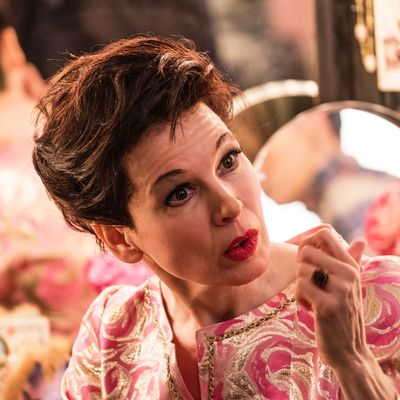
Saying that Ren├®e Zellweger will definitely get an Oscar nomination for playing Judy Garland in Judy is not the same thing as saying Ren├®e Zellweger is good as Judy Garland in Judy. A scale of ÔÇ£goodÔÇØ and ÔÇ£badÔÇØ doesnÔÇÖt really feel like the most accurate way to assess what the actress does in director Rupert GooldÔÇÖs biopic. ItÔÇÖs a big, committed performance, one that veers between acting and impersonation, and between attempts to capture the real Garland and the outsize image of her. There are times in which ZellwegerÔÇÖs absolutely electric ÔÇö like the scene in which Judy is hustled, disoriented and anxious, on to an opening night stage in London where sheÔÇÖs slated to perform for the next month or so. Disaster seems imminent, unavoidable even, but instead she pulls herself together out there in the bright lights, and belts out a bravura version of ÔÇ£By MyselfÔÇØ that the movie captures in a long, agile take. Garland was one of the great entertainers of Hollywood, and Zellweger canÔÇÖt replicate her singing, but what she does is lovely and just as impressive ÔÇö she evokes the spirit of a Garland performance, all rich voice and richer emotion.
Elsewhere, though, ZellwegerÔÇÖs Judy can feel like a butterfly weÔÇÖre watching get pinned for display while itÔÇÖs still alive and desperately wriggling. Judy, which was adapted by screenwriter Tom Edge from Peter QuilterÔÇÖs Tony-winning musical End of the Rainbow, takes place at a time when, broke and in increasingly poor health, Garland booked a five-week run of shows at the Talk of the Town that one critic at the time described by saying ÔÇ£She doesnÔÇÖt really give a concert ÔÇö she conducts a s├®ance.ÔÇØ Garland was an alcoholic and a drug addict whose reputation for being erratic and difficult had made it impossible for her to secure the kind of work that had once made her a star. SheÔÇÖd weathered multiple suicide attempts and four divorces ÔÇö her fifth marriage unfolds in a compressed form over the course of the film, with a smarmy Finn Wittrock playing her final husband, Mickey Deans. Judy is invested in GarlandÔÇÖs talent, but the movie is really enraptured by her tragedy ÔÇö the alcoholism and the breakdowns, the terrible taste in men and the bursts of self-loathing all put on display over a condensed stretch of time.
That particular conception of Garland gets underscored by a set of dire flashbacks to her early years as a teen star under the notoriously oppressive control of MGMÔÇÖs Louis B. Mayer (Richard Cordery), in which sheÔÇÖs played by Darci Shaw. The film presents these sequences with the kind of leaden import usually seen in a Batman movie portraying the death of Bruce WayneÔÇÖs parents. Mayer informs the young Judy that sheÔÇÖs a ÔÇ£fat-ankled gap-toothed rubeÔÇØ ÔÇö cut to 1968 Judy as a disaster of self-doubt. Studio handlers force pills down her throat, and as an adult she pops them with the open-palmed theatricality that you really only see in movies. The mistreatment Garland experienced as a young actor is a justifiably well-known part of her biography, an infamous example of how toxic the business could be to performers who had to present a smiling face to the public. But to treat it like an origin story the way Judy does, a key that so neatly unlocks all the components of her, ends up flattening Garland in ways that donÔÇÖt do her justice. She was an immensely complicated figure, but in Judy, sheÔÇÖs a martyr.
ItÔÇÖs no surprise, then, that the best parts of the movie are the ones that make space for flickers of discomfort. ThereÔÇÖs the aforementioned scene in which Judy is essentially shoved onto the stage by her long-suffering handler Rosalyn (Jessie Buckley, so excellent in Wild Rose), a process thatÔÇÖs repeated later with a lot less success. There are the times when Judy lashes out when her husbands, ex- and current, dare imply that her own behavior has had some bearing on the state of her career, and she stops being an object of pity and becomes one of exhilarating frustration. And thereÔÇÖs the thread about how terrible she feels leaving her younger children, Lorna (Bella Ramsey, Lyanna Mormont herself) and Joey (Lewin Lloyd) in L.A., and about how that might actually be the best place for them to stay. Zellweger clearly did her homework for Judy, studying up on GarlandÔÇÖs mannerisms and posture, and at one point offering up a laugh that makes her look eerily like the woman sheÔÇÖs playing. But itÔÇÖs hard not to gather up these complicated moments and wish for more of them ÔÇö to think about how much better it would have been if she had gotten to play Garland as a flesh-and-blood person and not as the saint of suffering for showbiz.


